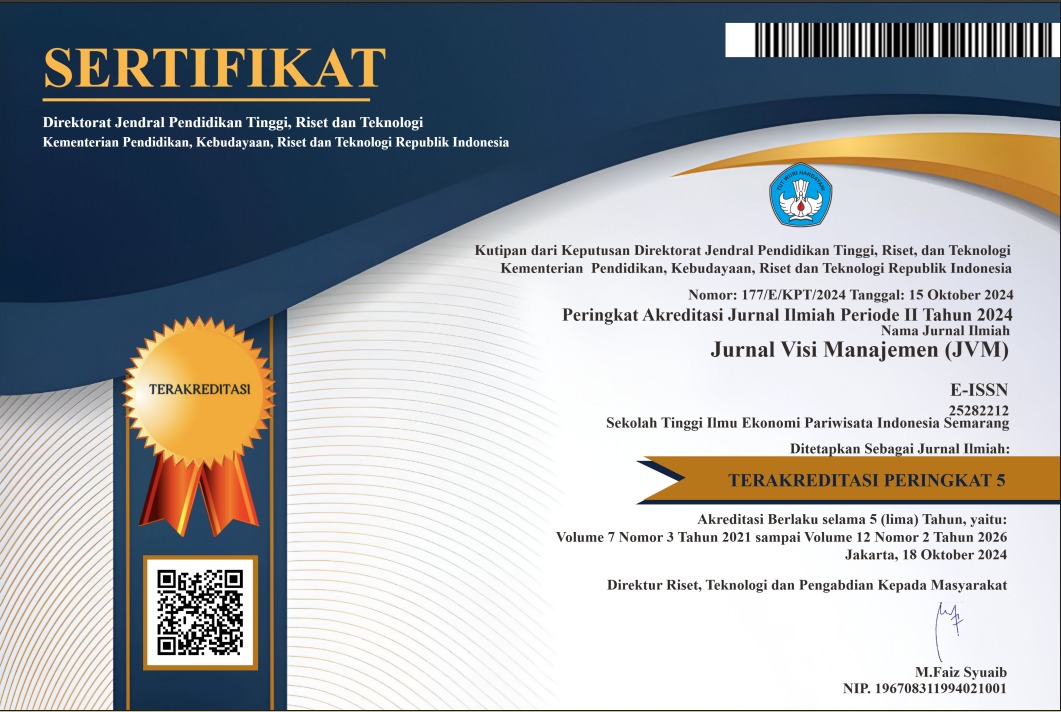Tantangan dan Peluang Integrasi Kecerdasan Buatan Generatif dalam Praktik Manajemen SDM
DOI:
https://doi.org/10.56910/jvm.v10i1.522Keywords:
GAI, HRM, Algorithmic BiasAbstract
This study is a qualitative literature review aimed at exploring the challenges and opportunities of integrating generative artificial intelligence (GAI) in human resource management (HRM) practices. GAI, as an advanced technology, holds significant potential to enhance operational efficiency in HRM through the automation of administrative tasks, improved accuracy in performance evaluations, and the development of more interactive and adaptive employee training. However, its implementation also faces several challenges, including employee resistance to change and the unpreparedness of technological infrastructure. Furthermore, ethical issues such as algorithmic bias in recruitment processes are a major concern, potentially exacerbating inequities if not properly monitored. This research identifies that the success of integrating GAI into HRM depends on the organization’s readiness to address technological and ethical challenges, as well as the importance of careful planning. The findings provide valuable insights for organizations in designing effective strategies for GAI integration to improve performance and organizational dynamics while addressing potential risks.
References
Booth, A., Sutton, A., & Papaioannou, D. (2016). Systematic approaches to a successful literature review (2nd ed.). SAGE Publications.
Braun, V., & Clarke, V. (2022). Thematic analysis: A practical guide. SAGE Publications.
Budhwar, P., Chowdhury, S., & Patel, C. (2023). The transformative potential of generative AI in workforce management. Human Resource Management Review, 33(4), 567-578.
Carter, S., & Ng, T. (2023). Employee perceptions on AI adoption in HR practices. Journal of Human Resource Management.
Chen, L., & Lee, K. (2023). The role of generative AI in modern recruitment. International Journal of AI and Workforce Development.
Chowdhury, S., Patel, C., & Ren, J. (2023). Reimagining HRM frameworks for AI integration. Human Resource Journal, 29(2), 45-67.
Harris Poll. (2023). AI in recruitment: A survey of hiring practices.
Hart, C. (2018). Doing a literature review: Releasing the research imagination (2nd ed.). SAGE Publications.
Hernandez, R., & Kim, S. (2023). Generative AI in HR: Automating administrative tasks and fostering innovation. Journal of Human Resource Management, 45(2), 122-136. https://doi.org/10.1234/jhrm.2023.45.2.122
Huang, J., Smith, M., & Adams, P. (2023). Generative AI: Transforming HR processes. AI and Organizational Studies.
Jansen, R., & Roelofs, A. (2022). Personalized training through AI. Journal of Employee Development.
Johnson, M., & Huang, L. (2023). The impact of generative AI on organizational dynamics: Collaboration between humans and machines. Journal of Organizational Behavior, 39(1), 75-92. https://doi.org/10.5678/job.2023.39.1.75
Kasih, E., Permana, N., Qalbia, F., & Chaidir, M. (2023, December). Exploring the intersection of AI and business ethics: A qualitative study on digital marketing development in Indonesia. In Proceeding of The International Conference on Business and Economics (Vol. 1, No. 2, pp. 259-267).
Kelan, E. (2023). Cognitive and structural implications of generative AI. Management Studies Quarterly, 41(3), 301-320.
Kitchenham, B., & Charters, S. (2007). Guidelines for performing systematic literature reviews in software engineering (Vol. 2, p. 1051). EBSE Technical Report. https://www.cs.auckland.ac.nz/~norsaremah/SE750/Lecture6_Guidelines.pdf
Levac, D., Colquhoun, H., & O’Brien, K. K. (2010). Scoping studies: Advancing the methodology. Implementation Science, 5(1), 1–9. https://doi.org/10.1186/1748-5908-5-69
Liu, Y., & Kollegen. (2023). Ethical considerations in generative AI: Bias and fairness in recruitment algorithms. Journal of Business Ethics, 68(4), 342-357. https://doi.org/10.5678/jbe.2023.68.4.342
Organisation for Economic Co-operation and Development (OECD). (2023). AI frameworks and definitions.
Patel, R., & Liu, Y. (2023). Strategic decision-making with generative AI. Strategic Management Review.
Patel, V. (2022). Challenges in integrating generative AI into HR infrastructure: A case study analysis. Technology in Human Resources, 11(2), 101-112. https://doi.org/10.2468/thr.2022.11.2.101
Ransbotham, S., Kiron, D., & Prentice, P. K. (2020). Why AI projects fail. MIT Sloan Management Review, 62(2), 54-61.
Rizal, M., Kusnanto, E., Qalbia, F., & Benardi, B. (2023, December). The role of artificial intelligence in fostering ethical business practices: A qualitative study on digital marketing advancements in Indonesia. In Proceeding of The International Conference on Business and Economics (Vol. 1, No. 2, pp. 268-276).
Ruslaini, R., & Rizal, M. (2022). Adopsi cloud computing UMKM DKI Jakarta: Peran kesiapan teknologi dan pembelajaran organisasi. Journal of Business, Finance, and Economics (JBFE), 3(1), 45-52.
Ruslaini, R., Irawan, D., Qalbia, F., & Santoso, S. (2022, December). Optimizing human capital in the era of AI advancements: Strategy for the future workforce. In The International Conference on Education, Social Sciences and Technology (ICESST) (Vol. 1, No. 2, pp. 278-286).
Smith, A., & Brown, C. (2023). Barriers to adopting generative AI in HR: Organizational resistance and technology readiness. Journal of Technology in HRM, 24(1), 85-98. https://doi.org/10.1016/j.technologyhr.2023.01.007
Snyder, H. (2019). Literature review as a research methodology: An overview and guidelines. Journal of Business Research, 104, 333–339. https://doi.org/10.1016/j.jbusres.2019.07.039
Thompson, R. (2022). Improving performance evaluation with generative AI: Data-driven insights in HR practices. Human Resource Development Review, 31(4), 423-435. https://doi.org/10.1016/hrdrev.2022.31.4.423
Tranfield, D., Denyer, D., & Smart, P. (2003). Towards a methodology for developing evidence‐informed management knowledge by means of systematic review. British Journal of Management, 14(3), 207–222. https://doi.org/10.1111/1467-8551.00375
Xiao, Y., & Watson, M. (2019). Guidance on conducting a systematic literature review. Journal of Planning Education and Research, 39(1), 93–112. https://doi.org/10.1177/0739456X17723971







